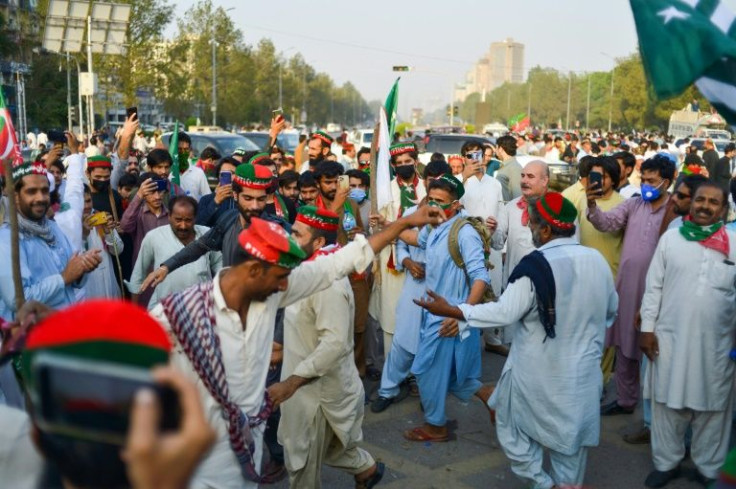U.S. Losing Major Nuclear-Armed Ally In South Asia As Pakistan Tilts To China: Report
KEY POINTS
- The end of America's Afghanistan campaign added to the breakdown of the relations
- Washington's improved relations with India also pushed Pakistan closer to China
- But, Pakistan Army still wants cordial relations with the U.S.
Pakistan, once one of Washington's most trusted allies, is shifting camps. This nuclear-armed nation in South Asia is reportedly tilting toward China, as the latest political developments in Islamabad suggest.
Last week, Pakistan’s recently-ousted Prime Minister Imran Khan conducted a mega rally, where he defiantly accused the U.S. of plotting to remove him from office. "Our people will not accept under any circumstances an imported government foisted upon us by an American conspiracy," he said, though he had little evidence to back up his claim.
Khan's outburst is reflective of the changing dynamics between the old allies and Pakistan's recently fostered "iron brotherhood" with Beijing. Such is their new rapport that Pakistan’s newly appointed foreign minister, Bilawal Bhutto Zardari, called China his "second home" during a recent tour.
What caused the rift with the U.S.? The decline of Islamabad's relationship with Washington has been "precipitated by the end of America’s Afghanistan campaign," Pakistani journalist Hasan Ali wrote in an opinion piece in the Time.
The event brought the "long-simmering tensions between the two countries to the surface, with each side holding the other responsible for its failure," the Time report said.
Pakistan claims it was coerced into the war in Afghanistan by the former deputy secretary of state, Richard Armitage, who threatened to bomb the country if it refused to cooperate. Armitage has denied the allegations.
Though both nations maintained a warm relation for decades, Islamabad's fondness for Beijing began in late 1980, after the U.S. sanctioned Pakistan for enriching uranium. The distrust between the former allies slowly resulted in Pakistan cultivating its relationship with China.
According to Time, America's withdrawal from Afghanistan and its aftermath steadily pushed Pakistan right onto China's camp. Another factor is Washington's improved relations with India, Pakistan's arch-enemy. The U.S. has successfully managed to draw India into regional coalitions against China, such as the Quad.
The China Pakistan Economic Corridor (CPEC), a collection of infrastructure projects under construction throughout Pakistan beginning in 2013, has made China the "linchpin of Pakistan’s economic development," Ali wrote in his report.
The relationship between Beijing and Pakistan is such that it is irrelevant who rules the country, as all are "bound to prioritize Pakistan’s relationship with China over that with the United States." The country's dependence on Chinese investment, and its anger against "American duplicity" have ensured that China wins over Washington.
That said, the Pakistan Army, the real power behind the throne, wants cordial relations with the U.S. for a multitude of reasons, including saving the country's faltering economy. Negotiations are still continuing to appease the U.S. to avail of an emergency assistance package with the International Monetary Fund.
The current government, a coalition led by Prime Minister Shehbaz Sharif, too appears committed to a policy of rapprochement with the U.S. That said, the writing on the wall is clear. For, China was the first country that Pakistan's foreign minister Bilawal Bhutto Zardari visited after his appointment.
There is also debate among many political parties in Pakistan that the "future belongs to China, and with it, Pakistan’s own future," the Time report added.

© Copyright IBTimes 2024. All rights reserved.





















